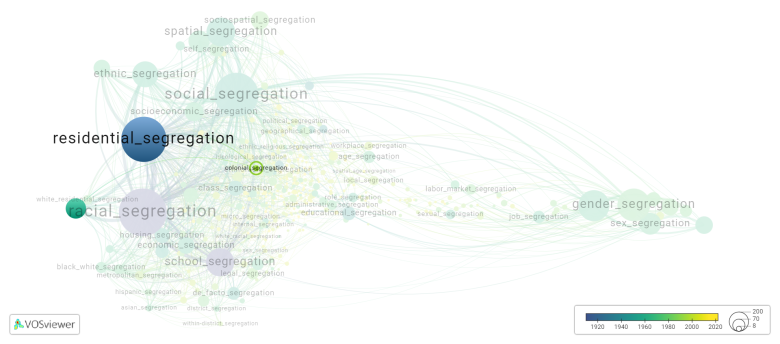Colonial segregation
Date and country of first publication[1]
2001
South Africa
Definition
Colonial segregation refers to the practice of separating people based on their race, ethnicity, or social class in colonial societies. This segregation often resulted in the unequal treatment and opportunities for different groups of people, with discriminatory policies and laws reinforcing the segregation. Examples of colonial segregation include the apartheid system in South Africa and the separate but equal policies in the United States. Such practices had long-lasting impacts on the social, economic, and political dynamics of these societies.
See also
Related segregation forms
Colonial segregation is frequently discussed in the literature with the following segregation forms:
residential segregation, racial residential segregation

This visualization is based on the study The Multidisciplinary Landscape of Segregation Research.
For the complete network of interrelated segregation forms, please refer to:
References
Notes
- ↑ Date and country of first publication as informed by the Scopus database (December 2023).
Colonial segregation appears in the following literature
Christopher P.J. (2001). Monitoring segregation levels in south african cities 1911 1996. South African Geographical Journal, 83(3), 249-257. https://doi.org/10.1080/03736245.2001.9713743
Wardrop J. (2006). Private cooking, public eating: Women street vendors in South Durban. Gender, Place and Culture, 13(6), 677-683. https://doi.org/10.1080/09663690601019927
Kruger L. (2009). Reassembling South African theatre history. Writing and Rewriting National Theatre Histories, 244-264. University of Iowa Press.https://doi.org/
Mpofu B. (2011). Undesirable Indians, residential segregation and the Ill fated rise of the white housing covenanters in Bulawayo, colonial Zimbabwe, 1930 1973. South African Historical Journal, 63(4), 553-580. https://doi.org/10.1080/02582473.2011.626437
Chappell D. (2013). The Kanak awakening: The rise of nationalism in New Caledonia. The Kanak Awakening: The Rise of Nationalism in New Caledonia, 1-299. University of Hawaii Press.https://doi.org/
Smiley S.L. (2013). Mental maps, segregation, and everyday life in Dar es Salaam, Tanzania. Journal of Cultural Geography, 30(2), 215-244. https://doi.org/10.1080/08873631.2013.779151
Warnke I.H., Stolz T. (2015). (Post ) colonial linguistics, or: What is colonial in colonially shaped discourses?; [(Post )Colonial Linguistics, oder: Was ist das Koloniale an kolonial geprägten Diskursen?]. Zeitschrift fur Semiotik, 35(3-4), 471-495. Stauffenburg Verlag.https://doi.org/
Chappell D. (2015). Decolonisation and nation building in New Caledonia: Reflections on the 2014 elections. Political Science, 67(1), 56-72. SAGE Publications Ltd.https://doi.org/10.1177/0032318715588121
Hochhäusl S. (2016). Grass roots modernism: Architecture and organization in austrian settlements and allotment gardens, 1921 1925. Reading the Architecture of the Underprivileged Classes, 119-136. Taylor and Francis.https://doi.org/10.4324/9781315603766-13
Basundoro P., Putra L.R.D. (2019). Contesting urban space between the Dutch and the sultanate of Yogyakarta in nineteenth century Indonesia. Canadian Journal of History, 54(1-2), 46-83. University of Toronto Press.https://doi.org/10.3138/cjh.ach.2018-0044
Ndumeya N. (2019). “Limiting the Domination”: Anti colonial African Protests in South Eastern Zimbabwe, 1929 1940s. Journal of Black Studies, 50(2), 111-134. SAGE Publications Inc..https://doi.org/10.1177/0021934718818987
Allsobrook C. (202). Integrating African Social Tenures through Rights Recognition in Land Reform. Philosophical Perspectives on Land Reform in Southern Africa, 203-224. Springer International Publishing.https://doi.org/10.1007/978-3-030-49705-7_11
Al-Darraji E.M.S. (2021). Cain Attacking Himself: Black Intra racial postcolonial Segregation as Presented in Amiri Baraka's Duthman and Charles H. Fuller's A Soldier's Play. Review of International Geographical Education Online, 11(5), 3654-3661. Eskisehir Osmangazi University.https://doi.org/10.48047/rigeo.11.05.252
Irvine P.M. (2021). From Grahamstown to Makhanda: Urban Frontiers and Challenges in a Post apartheid City. GeoJournal Library, 163-177. Springer Science and Business Media B.V..https://doi.org/10.1007/978-3-030-73073-4_10
Karkabi N. (2021). The impossible quest of Nasreen Qadri to claim colonial privilege in Israel. Ethnic and Racial Studies, 44(6), 966-986. Routledge.https://doi.org/10.1080/01419870.2021.1877314
Gomez-Temesio V. (2022). Homage to Ebola Fighters: Black Labor and Humanitarian Media Campaigns. Medical Anthropology Quarterly, 36(3), 329-349. John Wiley and Sons Inc.https://doi.org/10.1111/maq.12710
